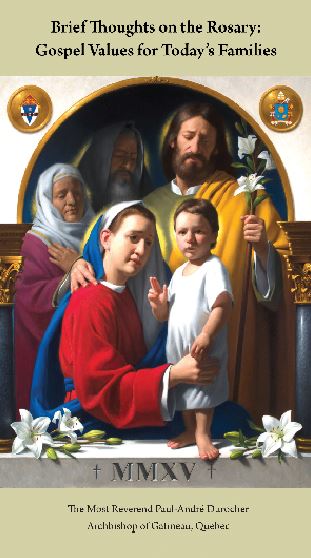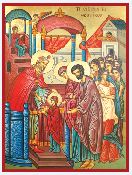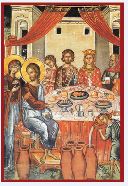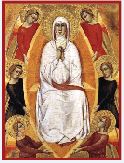Brief thoughts of Archbishop Durocher on the Rosary
 On October 7, 2014, memorial of Our Lady of the Rosary, the Most Reverend Paul-André Durocher, Archbishop of Gatineau and President of the Canadian Conference of Catholic Bishops, wrote a message to Canadian Catholics, inviting them to pray the Rosary for the success of the extraordinary Synod on the family that took place in Rome in October, 2014. Archbishop Durocher also invites the faithful to continue to pray until the next Synod in Rome in October, 2015, which will also be on the family, and which will study the recommendations of the 2014 Synod. Here are excerpts from his letter:
On October 7, 2014, memorial of Our Lady of the Rosary, the Most Reverend Paul-André Durocher, Archbishop of Gatineau and President of the Canadian Conference of Catholic Bishops, wrote a message to Canadian Catholics, inviting them to pray the Rosary for the success of the extraordinary Synod on the family that took place in Rome in October, 2014. Archbishop Durocher also invites the faithful to continue to pray until the next Synod in Rome in October, 2015, which will also be on the family, and which will study the recommendations of the 2014 Synod. Here are excerpts from his letter:
“Society depends on strong, healthy and holy families, not only to respond to the demands of the present moment but also to prepare for the future. Society needs the intimacy, fidelity, and forgiveness that only loving couples and happy families can give, just as homes and families are in turn called to care for and strengthen their communities and society. Our challenge today is to find better ways to marry family life, with the strong and holy intimacy only it can offer, to a missionary and evangelizing vision which responds to Christ’s command to go forth to all peoples and to all the earth...
 “For Catholics, October is traditionally dedicated to the Rosary, and includes the memorial of Mary, Our Lady of the Rosary, on October 7. This past year, my diocese was involved in preparing French-language resources for the annual National Week for Life and the Family, an initiative of our Conference. As part of these materials, I prepared a short series of reflections on the family Rosary. These thoughts on how the mysteries of the Rosary continue to have significance for families today have been recently published not only in French, but also in English, Italian and Spanish. I am giving printed copies to Pope Francis and to each participant in the Synod on the family. At the same time, our Conference will make the electronic texts available to everyone on its website. (www.cccb.ca)
“For Catholics, October is traditionally dedicated to the Rosary, and includes the memorial of Mary, Our Lady of the Rosary, on October 7. This past year, my diocese was involved in preparing French-language resources for the annual National Week for Life and the Family, an initiative of our Conference. As part of these materials, I prepared a short series of reflections on the family Rosary. These thoughts on how the mysteries of the Rosary continue to have significance for families today have been recently published not only in French, but also in English, Italian and Spanish. I am giving printed copies to Pope Francis and to each participant in the Synod on the family. At the same time, our Conference will make the electronic texts available to everyone on its website. (www.cccb.ca)
“The Rosary is a prayer and a meditation easily adapted to different situations in life. It allows us to see in our own joys and sufferings, our personal shadows and lights, the glories to which we are called by our Heavenly Father through Our Lord Jesus and the gifts of the Holy Spirit. The Rosary can help us link our personal lives with the life of Christ and his loving Mother, and to reflect on how we are called by our Lord to be the salt and the light of the world.”
Here are these brief reflections on the Rosary by the Most Rev. Paul-André Durocher, reproduced in full with the kind permission of Archbishop Durocher and of the Canadian Conference of Catholic Bishops:
Credit: English translation of Brief Thoughts on the Rosary: Gospel Values for Today’s Families, by the Canadian Conference of Catholic Bishops, copyright © Concacan Inc., 2014. All rights reserved. Used with permission. www.cccb.ca. Original text in French by the Most Reverend Paul-André Durocher, Archbishop of Gatineau © Archdiocese of Gatineau, 2014.

 1. The Annunciation of the Angel Gabriel to the Virgin Mary
1. The Annunciation of the Angel Gabriel to the Virgin Mary
• Obediance
At the heart of the story of the Annunciation is the “Yes” from Mary who accepts to do God’s will. To obey comes from two Latin words which literally mean “to listen from below” or, in a broader sense, “to listen respectfully”. Mary listens respectfully to God’s messenger. Every family member has to listen respectfully to the other. Sometimes we think this only means the child listening respectfully (obediently) to the adult. But, basically, every member of the family has to learn to listen respectfully to the other, in order to live together in mutual harmony.
Prayer Intention: Lord, help us to seek your will and respond to it promptly, in all our actions and decisions, just as Mary did.
 2. The Visitation of the Virgin Mary to her Cousin Elizabeth
2. The Visitation of the Virgin Mary to her Cousin Elizabeth
• Service
Mary has just learned she is pregnant. Yet despite the physical, emotional and relational upheaval this brings, her first thought is for her elderly cousin Elizabeth who is also expecting a child. Mary goes to see her immediately. One can imagine the young teenager helping her older relative through the difficult months of pregnancy. Despite our own challenges and upheavals, we too are called to serve each other. This mutual service helps the whole family deal with hardships and makes difficult moments easier.
Prayer Intention: Lord, help us be available to others and of service to them, so we may be true witnesses to your Gospel.
 3. The Nativity of Jesus in the Stable at Bethlehem
3. The Nativity of Jesus in the Stable at Bethlehem
• Joy
“I am bringing to you news of great joy,” the angel says to the shepherds. The birth of Jesus is a source of joy for all who see in it how God comes to visit us. Joy is one of the fruits of the Holy Spirit. Joy isn’t a fleeting pleasure – self-centred, soon over, superficial. Joy is enduring, loving and profound. When there is joy at the heart of the family, every moment of life together becomes precious. Joy is a true gift for the whole family.
Prayer Intention: Lord, come and deepen the joy of Christ in us, so we can let it shine in our families and all around us.
 4. The Presentation of Jesus in the Temple by Mary and Joseph
4. The Presentation of Jesus in the Temple by Mary and Joseph
• Reverence
Reverence is not an everyday word. It
means “profound respect”. When we listen to the account of how Jesus was presented in the Temple, we feel reverence. There is the reverence of Simeon as he takes the child into his arms and blesses God. There is the reverence of Anna, that elderly prophetess, as she celebrates God because of Jesus. These two elderly people are full of reverence for the child. This is a beautiful virtue to cultivate in the family, from the youngest to the oldest. We do this is because every person is unique and possesses extraordinary value. Reverence is our response to the dignity of the other.
Prayer Intention: Lord, help us to recognize your presence in our brothers and sisters, and respect how each of us is unique.
 5. The Finding of Jesus in the Temple
5. The Finding of Jesus in the Temple
• Honesty
The young Jesus did not follow his parents on the journey home. Joseph and Mary were worried sick as they looked everywhere for their child. Then they find him. We are witnesses, not to the parental reprimand of a young runaway, but to a frank, honest exchange where each speaks respectfully, forthrightly. Mary expresses her fear. Jesus expresses his conviction. The parents do not understand their Son, but they share with each other. Their honesty and capacity to open their hearts frankly to each other are essential for communicating with the other, for encountering one another, for relating to each other. To be able to talk to one another, to listen to each other, even when we do not understand, is an important virtue for family life.
Prayer Intention: Holy Spirit, inspire and support all parents when educating their children in the faith, so they can find the truth always and everywhere.

 1. The Baptism in the Jordan
1. The Baptism in the Jordan
• Responsibility
Jesus’ baptism was the turning point, the moment when Jesus left behind his tranquil, “hidden” life to become engaged in preaching and action. At his baptism, Jesus hears the voice of His Father as a call. “The Lord has sent me,” he will later say when in Nazareth. More than that, Jesus responded. In the word “responsibility” is hidden the word “response”. To be responsible is to respond to the other’s call, to take it seriously, and to accomplish what one is called to do. In family life, we are responsible for one other. We need to respond to one other, and be faithful to the engagement to which we have been called. Just like Jesus at his baptism.
Prayer Intention: Lord, help parents and grandparents understand and assume their family responsibilities in the light of the Gospel.
 2. The Wedding at Cana
2. The Wedding at Cana
• Faith
One might think the intention of this story is to reveal how the dignity of marriage is blessed by the presence of Jesus. This is not what John’s Gospel intends. For the Evangelist, this story is important because it is the first sign by Jesus, his first miracle. From this moment on the disciples believe in him. The true gift of Cana is not the abundant wine — it is faith. Do we not need that faith in our families? Faith in God? Faith in the other? Faith is a force, a virtue, that enables us to see beyond the immediate and the obvious. The family must shelter the faith, protect it, nourish it. Jesus is present in the family just as he was at Cana, and he calls us to faith.
Prayer Intention: Lord, increase our faith and help us to be privileged witnesses of the faith in our family.
 3. The Proclamation of the Reign of God and the Invitation to Conversion
3. The Proclamation of the Reign of God and the Invitation to Conversion
• Justice
Saint Paul says the Reign of God is “justice, peace and joy in the Holy Spirit”. First of all, justice. To be just is to be “attuned” to the will of God. “Happy are those who are persecuted for justice; the Kingdom of God is theirs.” To live justice in the family is first of all to seek out God’s will together, to be attuned to it, to put it into practice. To live justice in the family is to be committed to living justice among ourselves. But it is also to be involved so that the world becomes more just. The Christian family should be a school of justice, a school of the Kingdom of God.
Prayer Intention: Lord, make us defenders of justice and peace, so we can share and be merciful with the poor, the weak, the marginalized.
 4. The Transfiguration
4. The Transfiguration
• Wonder
Peter, James and John stand in amazement before the transfigured Christ, to the point of saying silly things. But this experience touches and transforms them profoundly, preparing them to live the Paschal Mystery. There are some voices that proclaim disenchantment with the world. This is fine if it means we are freeing ourselves from superstition. But it is sad if it means we are losing our sense of profoundness. To know how to be amazed is to look at the reality around us with the eyes of a child. How can we be a child of God any other way? The Christian family should cultivate the sense of wonder, so God can be recognized in simple daily events and the people around us.
Prayer Intention: Lord, change our way of looking so we can see you in everything, and always be filled with wonder.
 5. The Institution of the Eucharist
5. The Institution of the Eucharist
• Gratitude
The word “Eucharist” simply means “thanksgiving”. Jesus is calm before the torture and horrible death that await him. What does he do? He says “thank you” to his Father. The virtue of gratitude is fundamental to Christian life. A Eucharistic spirituality is first of all a spirituality of gratitude, which says “thank you” in all circumstances. Learning to say “thank you” is a fundamental part of a child’s upbringing. Children learn this best when they see their parents thank each other … and hear their parents saying “thank you” to them also. Let us learn together to become grateful in our very being.
Prayer Intention: Lord, transform our lives into “thanksgiving”.
 1. Jesus’ Agony in the Garden of Gethsemane
1. Jesus’ Agony in the Garden of Gethsemane
• Prayer
Jesus is facing his death. He immerses himself in prayer. He sees his death not as a simple accident of history, but as an event linked to his Father’s will for the world. He looks for the meaning of it in prayer. This ability to keep all of life in the perspective of prayer used to be called “piety”. A beautiful word, but which does not seem to have aged well. So we can talk instead about how prayer is not just an activity we do, but an attitude we cultivate, an outlook we sustain. Prayer is a strength to develop in the Christian family because it enables us to discover meaning in our lives.
Prayer Intention: We ask you, Lord, for the spirit of piety.
 2. The Scourging of Jesus
2. The Scourging of Jesus
• Courage
During the agony in Gethsemane, Jesus was confronted by thoughts about suffering, but now he physically experiences it. He intimately knows the pain of those who are tortured, traumatized, gravely ill. He shows great courage in pardoning his torturers while enduring his pain. The family too sometimes experiences great suffering and pain. Then we need to go deep within ourselves, where the Spirit of Jesus lives, to find the courage necessary to keep going, to be able to pardon, to go beyond the ordeal. Even more, we are called to support the many men and women around us who also need to be courageous in their sufferings.
Prayer Intention: Lord, give us the courage to live every moment of our lives in the image of Christ.
 3. The Crowning with Thorns
3. The Crowning with Thorns
• Humility
This crowning causes pain, but even worse it tries to humiliate Jesus and deny his human dignity, mocking his claim to be King. Jesus was never proud, but always humble. Thus his torturers were unable to provoke a reaction: Jesus knows his Kingdom is not of this world. In the family we often try to test one another, in order to protect our pride. Jesus shows us another way, the way of humility. We know God loves us, and that our dignity is inviolable. Let us seek to be humble among ourselves, as Jesus was.
Prayer intention: We ask you, Lord, for the spirit of humility.
 4. The Carrying of the Cross
4. The Carrying of the Cross
• Resoluteness
Jesus must have been weakened by the torture he was forced to undergo. Now he must carry that heavy piece of wood to the top of a high hill, while being shoved and hit. Tradition tells us he would fall three times, and three times he got back up so he could complete the journey he had accepted to undertake. What resolve! It also takes resoluteness in the family not to quit at the first obstacle, to keep going after one has fallen, to continue on the way. We need to help each other develop this resoluteness, which is founded on God’s love for us.
Prayer intention: Lord, give us the strength to keep going forward in our life of faith and on our Christian mission, no matter what the challenges may be.
 5. Jesus is Crucified and Dies on the Cross
5. Jesus is Crucified and Dies on the Cross
• Love
Sometimes, when thinking about the Crucifixion, we are aghast at the suffering Jesus had to undergo. Crucifixion was a particularly cruel torture invented by the Romans. What we see is Jesus suffering. But he was being carried by the power of the Spirit living in him. Jesus transforms his suffering into the greatest testimony of absolute love that the world has ever known. Sacrifice is suffering transformed by love. On the Cross, Jesus turns his death into a sacrifice, the final Word of his love for his Father and for us. Such love can only be divine. To know it, we need to be open to the Spirit of Jesus. In this way we can learn, as a family, to live by love for one another, to transform our small sufferings into sacrifices that give life to those around us.
Prayer intention: Lord, without love we are nothing. Help us love each other with the same love with which you love us.
 1. The Resurrection of Jesus
1. The Resurrection of Jesus
• Hope
Sometimes people say a situation is “hopeless”. As if hope is found in the situation itself. Hope is a power that lives in the human heart. We have to carry our hope to the heart of situations that appear blocked and with no way out. Where does this hope come from? From the conviction that in his Resurrection Jesus overcame the power of death. With him, we are already resurrected. Within our families, we can bring hope everywhere we go, no matter what situation confronts us. With Christ, no situation is hopeless because hope lives within us.
Prayer Intention: Lord, fill us with hope so that with peace and joy we may shine like lights in the world.
 2. The Ascension of the Lord into Heaven
2. The Ascension of the Lord into Heaven
• Trust
To trust God is not to wait for God to do everything for us! Trust is reciprocal: God also trusts us. He gave us the task of building up his Reign here, today. When Jesus was leaving this world, he put his trust in us. He leaves room for us to follow him. In the family, we learn to trust by creating spaces where each of us can truly become who we are meant to be. It is said that trust is earned, as if trust were a favour to be granted. Trust is a virtue, a strength that is cultivated, that is allowed to grow in and around ourselves. It is first of all a gift from God to be made fruitful, and to share with others so they, in turn, may grow in trust.
Prayer Intention: Lord, make fruitful in us the gift of trust, so we can commit ourselves fully and boldly to following you.
 3. The Descent of the Holy Spirit in the Upper Room
3. The Descent of the Holy Spirit in the Upper Room
• Enthusiasm
The Greek root of the word “enthusiasm” speaks of God (theo) inside (en) us. To be enthusiastic is to be filled with the Spirit of God. What an extraordinary virtue, what a force in favour of life, of growth and of generosity! Enthusiasm breaks down all apathy, all indifference. To cultivate enthusiasm in the family is to be open to the gift of the Spirit, in order to embrace life fully and share it abundantly.
Prayer Intention: Lord, you want us to be free. Help us to cultivate the enthusiasm which makes our burdens light and our hearts overflow with gladness.
 4. Mary’s Assumption into Heaven
4. Mary’s Assumption into Heaven
• Solidarity
In the mystery of the Assumption, Mary participates in the Resurrection of her Son, Jesus. What is promised to all believers is already realized in her: “If we have died with him, we will also reign with him.” Mary was so near to Jesus on the Cross that she now shares his glory in heaven. She lives in complete solidarity with her Son, the solidarity promised to us, the solidarity which already makes us brothers and sisters of Jesus. The family is the place where solidarity is learned. Yes, as family we are related by blood, but the faith that unites us brings us together even more closely.
Prayer Intention: Mary, Mother of the Church, teach our family how to become a little Church in the image of Christ, where love, sharing, and mutual support reign.
 5. Mary is Crowned Queen of Heaven and Earth
5. Mary is Crowned Queen of Heaven and Earth
• Recognition
To celebrate Mary as the Queen of heaven and earth is to recognize the unique role she plays in the history of salvation and in our own history. Learning to recognize the important role each person has in our life story, celebrating what they do, what they are for us – this is one of the joys of family life. Together, let us recognize the gift of others, let us celebrate their presence in our lives, and let us taste the joy already promised to us with Mary in heaven.
Prayer Intention: Mary, following your example, we give thanks to God for all things.

